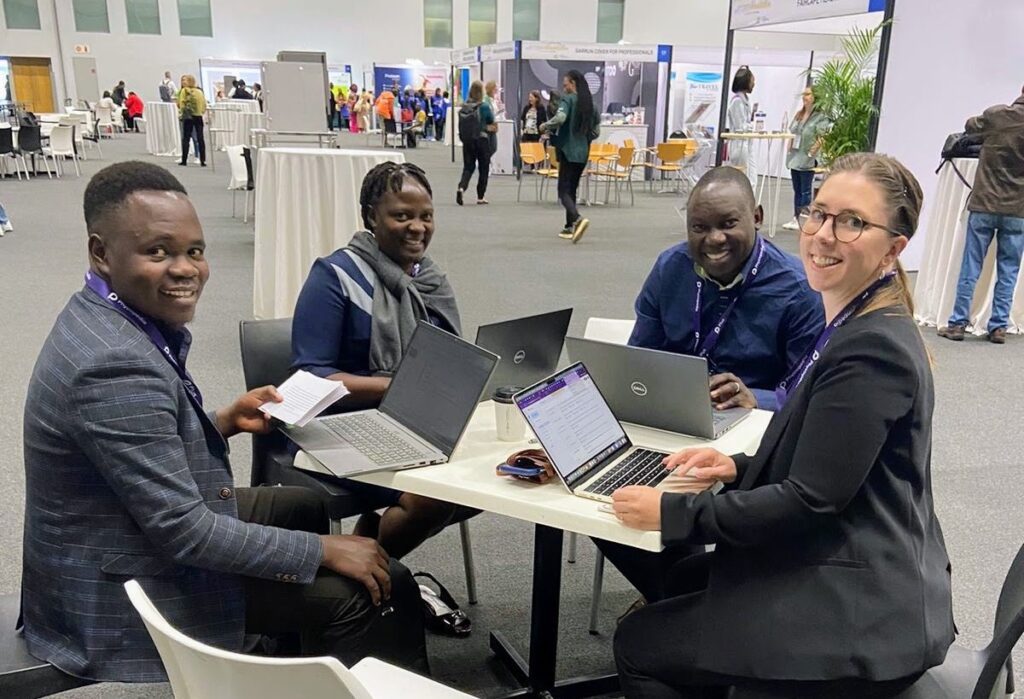
Yara Peterko for ReLAB-HS
The importance of a robust and united rehabilitation workforce cannot be overstated in meeting the increasing demand for rehabilitation services, particularly in regions with limited resources. Key to addressing this challenge are efforts to promote interprofessional collaboration and research to drive change. Financial constraints and lack of experience make it challenging for many rehabilitation professionals in Uganda to participate in international events, limiting their exposure and potentially demotivating them from pursuing rehabilitation-related research.
With support from Learning, Acting, and Building for Rehabilitation in Health Systems (ReLAB-HS), an interprofessional group of rehabilitation professionals presented their work on the International Rehabilitation Education and Training Toolkit (IRETT) at the World Physiotherapy (WPT) Africa Region Congress 2024 in Cape Town, South Africa.
In Uganda, professional associations, regulatory bodies, and training institutions have been implementing the IRETT to leverage interprofessional collaboration to strengthen workforce development activities in the country. Through regular online meetings with international mentors and local in-person meetings, ReLAB-HS has supported these professional bodies to strengthen academic programs, update regulation documentation, and develop new national professional development training opportunities for physiotherapy, occupational therapy, speech and language therapy, and orthopedic technology. As a result of their exceptional work together, one person from each profession was selected to present their achievements at the WPT Africa Region Congress. This was the first time that most of them had attended or presented at an international conference.
ReLAB-HS supported this team of rehabilitation professionals throughout their journey, from implementing the IRETT tools to delivering the presentations. This included mentoring to write and submit the abstracts, preparing for the presentations and navigating the conference experience, and delivering the presentations.
This professional guidance along with financial assistance enabled these rehabilitation professionals to attend the Congress with confidence, knowing they were fully prepared to share their work. As Margaret Namatovu, an orthopedic technologist, expressed, “Without the support, I wouldn’t have been able to go to the WPT Africa Congress.”
Attending the Congress emphasized the importance of research in driving change and enhancing rehabilitation practices. Before attending, some of the presenters felt that presenting on an international stage required large-scale, statistically significant data. Amon Nuwahereza, a physiotherapist, shared, “What was new to me and has changed the way I look at things is the fact that you can generate an abstract from anything that has been done. We used to think it had to be something statistically significant, but I learned that sharing experiences and successes is also valuable.” This shift in perspective has inspired the team to embrace knowledge sharing as a powerful tool for advancing rehabilitation in Uganda.
Calvin Kisembo, a speech and language therapist, echoed these thoughts saying, “Research is the way to go…So I think [all] research…should really be shared.…maybe this [information] can be used by other people.” This realization has motivated the team to encourage more research within Uganda’s rehabilitation community, where participation in research has historically been low.
Determined to share the insights and knowledge gained from the Congress, the team intends to leverage various platforms to disseminate learnings with their colleagues, students, and wider professional networks. Amon has already begun applying his learnings, particularly in the context of curriculum development for a master’s program in physiotherapy in Uganda. Herbert Omoding, physiotherapist, emphasized the importance of sharing at professional gatherings: “Annual general meetings are a key platform to share experiences, especially for those who may not often get the opportunity to present at international stages. Whatever you’re doing, it is possible to share it at any stage, and within the country, this can be an opportunity to encourage other professionals.” Margaret added, “I’m planning to write research projects and help others build their research skills, which will take our association to another level.”
The insights gained at the Congress have also reinforced the importance of interprofessional collaboration. “It is very hard usually to find that relationship between rehabilitation professionals. We always think the next rehab professional is going to be snatching away either patients or services from you, and yet actually we can complement each other for the betterment of the services that we offer, but also the people we work with,” Herbert shared. It was this collaboration between the different professions that stood out to the presentation audience, who complimented the team’s achievements through the collaborative use of the IRETT tools.
For a group of dedicated Ugandan rehabilitation professionals, attending the WPT Africa Region Congress was a transformative experience. Their presentations highlighted not only the IRETT tools themselves but also the collaborative process that brought them to life, involving professionals across various disciplines and regions in Uganda. The support they received opened doors, boosting their confidence and motivating them to engage more deeply with research and international collaboration. As a demonstration of their commitment to building a stronger foundation for rehabilitation research and professional development in Uganda, the team will collaboratively implement Uganda’s first interprofessional online training program on research and abstract writing. Already, over 50 participants from three professional associations have registered.
With a renewed focus on interprofessional collaboration and research, these rehabilitation professionals are poised to drive the field forward in Uganda by strengthening workforce development. Their journey to Cape Town was more than just a chance to present—it was a catalyst for change that will continue to influence the future of rehabilitation in Uganda.